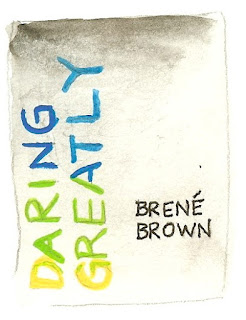Brené’s daughter was freaked out about having to race breast stroke at a meet, that the breast stroke wasn’t her event, that she’d be the last girl in the water. Brené asked her, “What if your goal for that race isn’t to win or even to get out of the water at the same time as the other girls? What if your goal is to show up and get wet?”
Brené explained that there were many things she’d never tried in her life because she feared failure. As a result, she’d missed out on feeling brave. Her daughter could have scratched, could have avoided the whole contest. Instead, she “got wet,” performed pretty badly, but felt brave afterwards. I guess Brené’s advice is what being a “vulnerability researcher” is all about.
Elsewhere in the book, Brené thinks about the well-known quote, “What would you attempt to do if you knew you could not fail?” And instead she asks this question, “What’s worth doing even if I fail?”
That’s a whole different question! In the first, you’re evaluating your choices while liberated from potential failure; you’re saved from failure in advance. In the second, failure – in all its soul-crushing devastation – descends. The second question forces you to confront the experience of failure, forces you to decide whether to be brave and still do it. It presupposes failure and then asks, “So what will you do with that information?”
Failure is a profound experience. Such a bottoming-out, crushing, unpleasant experience. I failed so badly at graduate school, I think it left me with a stutter for a while: I was afraid of expressing myself and being shot down yet again. But it set in motion a new plan for my life, new paths I’d explore. It helped me define what I wanted and where I’d find it. Mostly I think if I’m happy with my life, even the bumps, the mistakes, and the failures got me here so they all served a purpose.
My mother used to say whatever doesn’t kill you outright makes you stronger (which drove me crazy as a kid). That whole graduate school experience made me a little less fearful of failure. It did something to my self-esteem, too. After a while, I could look at academia and critique it instead of feeling demeaned by it. I could understand the influences I’d let operate on me and instead know that I had to make better choices for myself. I began to know myself as resilient.
But twice (at least) I dodged the bullet, didn’t get in the water. Both involved travel to somewhat risky locales, but I think I exaggerated the risks to justify my fears. I still feel squirmy about them, knowing that I caved, knowing that I missed two extraordinary opportunities.
So what does all this mean for my Third Third? How much of my future planning is constrained by a fear of failure? What if I sat here and said, “Try it. It will all go wrong, but will that matter in the end? Will you feel squirmier for not doing it than you will for trying it?”
The thing about the fear of failure is that you have to dissect it. Is it fear of failure or are you just not interested in pursuing something? Are you just fooling yourself (“Oh, I don’t really want to do that anyway.”) or are you backing away? Sometimes we’ve become so practiced at eliminating options that we don’t even know why they fall off the radar. And sometimes, we just dawdle them away.
So now I’m going to look at my assorted Third Third scenarios and examine them: would I feel brave afterwards? Would I feel squirmy if I didn’t pursue them? “What’s worth doing even if I fail?”
* Special little technological treat that I just discovered from Pogue’s Basics by David Pogue. He has all sorts of handy dandy little tricks, like this one: if you have to write Brené with that accent over the é, and you have a Mac, you hold down the e key and – lo and behold – seven different variations of e show up and you get to pick the one you want! That is my delight of the day!



This comment has been removed by the author.
ReplyDeleteI often wonder whether growing up after Title 9 (enacted in 1972) makes a difference for females. I did not have the opportunity to play sports, particularly team sports, when I was growing up. I did not get to experience losing and failing as something that happened to everyone, even the good players, on a frequent basis. I did not experience it as something where you graciously high-fived your opponent. put behind it you, and moved. Failure was shameful, embarrassing, a judgment on yourself as a person. I did not learn how to accept "failure" as a normal part of life when I was young, and it's a tough lesson to learn when you are older.
ReplyDeleteHow do you define "failure" anyway? Is not winning = failure? Is coming in second = failure? Is coming in last = failure? Is not trying = failure?